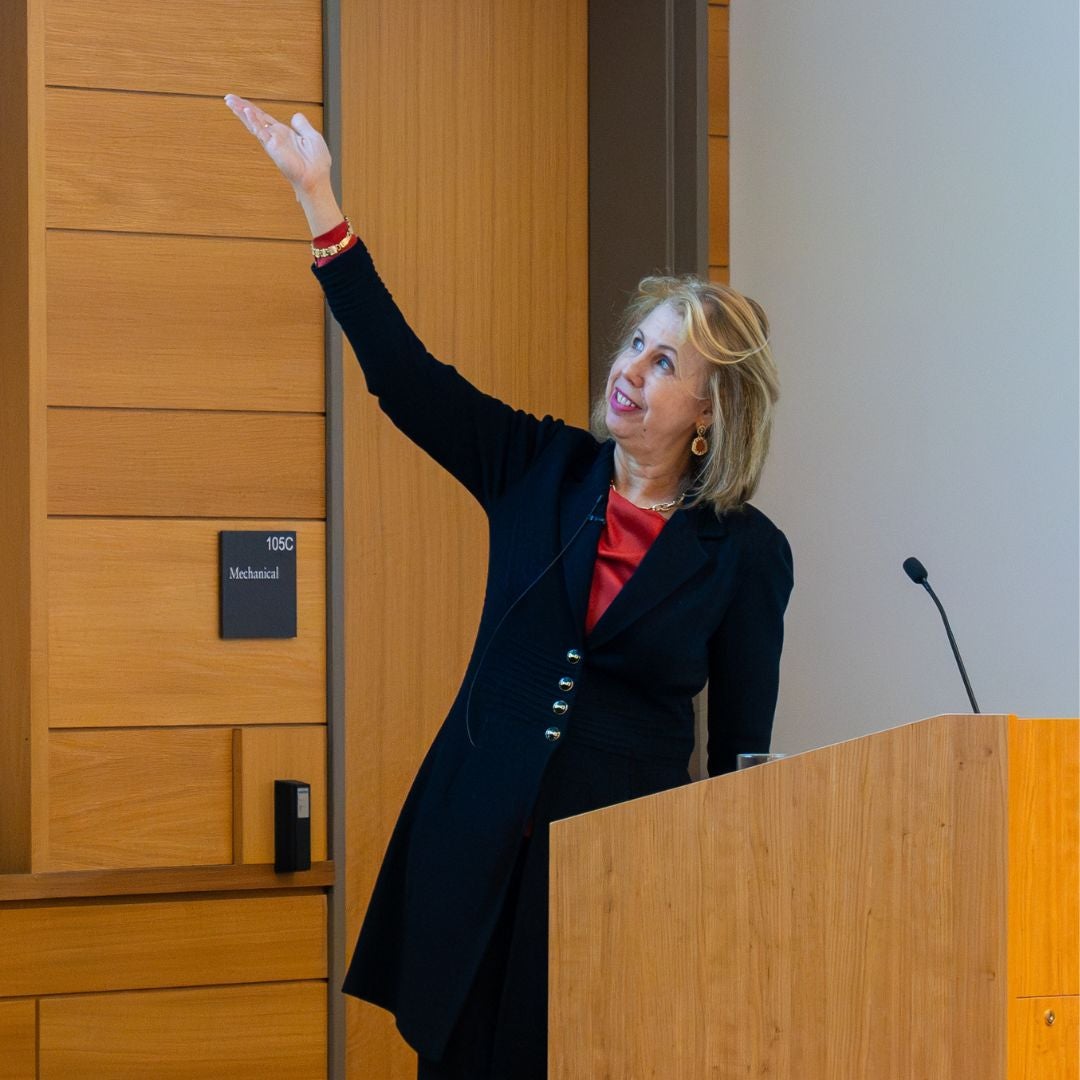“These are the conditions of an information emergency: Falling trust, cynicism, and alienation from our systems, which matters more than ever now because I think the battle surface of politics is information. What people know, what they believe, and who they trust has always been and is more important than ever in shaping the health of our communities and the health of our society.”
Former TIME Magazine editor-in-chief Nancy Gibbs defined and explored this information emergency and the upcoming presidential election at the 2024 Amanpour Lecture. The lecture series, endowed by Christiane Amanpour ’83, Hon. ’95, brings well-respected journalists to campus each year to discuss current topics in the industry.
“Christiane has been such an icon and a beacon to us,” Gibbs said at the start of the lecture. “If you want to know how to interview a tyrant, watch Amanpour. If you want to understand how to be fair without being morally numb, watch Amanpour. If you want to understand how to bring your whole self, head and heart, to your work, watch Amanpour. She has been a Northstar for us.”
Gibbs is the author of the most cover stories in TIME history, including the award-winning Sept. 11 black-border issue. She’s covered four presidential campaigns, co-writing two best-selling presidential histories with Michael Duffy. In her four-year tenure as editor, Gibbs established the TIME’s documentary division and increased digital viewership across the world.
The 2024 presidential election bears the closest resemblance to the election of 1968, according to Gibbs, when the incumbent president declined re-election and assassinations tainted the political landscape. The difference between these two elections, though, is the public’s trust in government, which has sharply declined.
An increasing number of people report feeling “news fatigue” and actively avoiding news, according to Gibbs. This is especially prevalent among younger audiences, with only 19% of 18 to 29-year-olds reporting that they regularly follow the news.
Gibbs said that this lack of public trust is shared by both the mainstream media and the U.S. government. She cited a Georgetown University poll that found 81% of Americans think their democracy is being threatened, almost half of whom blame the mainstream media. Gibbs doesn’t attribute this lack of trust to poor reporter performance, but, due to perceived bias on the part of the public.
“It surprises people when I tell them that in more than 30 years in a newsroom when I was assigned the major stories of the time, including five presidential elections, no one ever told me what our position was supposed to be or how I was supposed to write those stories,” Gibbs said. “And yet, the perception that people who own newsrooms or lead them are telling their reporters what to write is a widespread and, I think, very dangerous perception.”
Behind this perceived bias in the media lies a need for certainty, according to her. People seek the comfort of certainty, often reinforced by social media consumption, whose algorithms, Gibbs said, often leave people in echo chambers.
“Those surveys that ask ‘Do you trust the media’ are misleading because, in fact, people trust their own news sources,” she said. “They don’t trust what you’re watching and reading, they trust what they’re watching and reading. If you ask people ‘How worried are you about whether your news source is biased,’ there’s some worry about that, [but if you ask] ‘How worried are you that other people’s new sources might be biased’ they’re really really worried about that.”
Gibbs argued that it is unfair to ask the press to save democracy, as journalists can only provide voters with the information they need to participate in democracy. Instead, she encouraged the audience to engage and create an open dialogue with those who have conflicting viewpoints with their own. According to her, people get smarter by engaging with other’s who they disagree with.
Gibb’s speech was followed by a brief Q & A moderated by URI Harrington School professor and chair of journalism and public relations, Dan Hunt. When asked by a current journalism student how to stay encouraged despite this distrust in the media.
“There is understandably a lot of focus on the economic challenges that the industry is facing and those are real,” Gibbs responded. “A lot of passionate, purpose-driven people are trying to figure out the business model question so that’s one set of issues, but I’m pretty confident that reliable information is something people need to live successful lives. Like you need food, you need water, you need to breathe the air, and you need to be able to have access to information that is true. It’s a human right to have access to information and so I believe that the demand for what journalists do is always going to exist.”
Watch the full lecture on YouTube.

